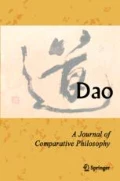Abstract
As the founders of Contemporary Neo-Confucianism, Mou Zongsan and Tang Junyi developed different interpretations of Zhang Zai’s and Wang Fuzhi’s philosophies of qi. In this essay, both the strength and weakness of their interpretations will be critically examined. As a contrast, an alternative interpretation of the School of qi in Song-Ming Neo-Confucianism will be outlined. This new interpretation will uncover that, like Leibniz, Zhang Zai and Wang Fuzhi introduced a non-substantivalist approach in natural philosophy in terms of an innovative concept of force. This interpretation not only helps to show the limitations of Mou Zongsan’s and Tang Junyi’s understandings of Zhang Zai’s and Wang Fuzhi’s doctrines of qi, but also indicates a way to bridge the traditional Chinese philosophy of nature and modern physics. More generally, our critical discussions will bring to light a new angle with which to re-appreciate Mou Zongsan’s and Tang Junyi’s contributions to the development of Confucianism.
Similar content being viewed by others
References
Chan, Wing-cheuk. 2000. “Leibniz and the Chinese Philosophy of Nature.” Studia Leibnitianna , Supplementa 33: 210–223.
Chan, Wing-tsit. 1963. A Source Book in Chinese Philosophy. Princeton: Princeton University Press.
Feng, Youlan 馮友蘭. 1987. A New History of Chinese Philosophy 中國哲學史新編. 7 Vols. Beijing 北京: Renmin Chubanshe 人民出版社.
Leibniz, G. W. 1951. Selections. Ed. & trans. by Philip P. Wiener. New York: Scribner.
———. 1969. Philosophical Papers and Letters. Ed. & trans. by Leroy Loemker. Dordrecht: Reidel.
Mou, Zongsan 牟宗三. 1955. Philosophy of History 歷史哲學. Hong Kong 香港: Rensheng Chubanshe 人生出版社.
———. 1968. Mind as Substance and Nature as Substance 心體與性體. 3 Vols. Taipei 台北: Zhengzhong Shuju 正中書局.
———. 1970. Philosophy of Life 生命的學問. Taipei 台北: Zhengzhong Shuju 正中書局.
———. 1980. Intellectual Intuition and Chinese Philosophy 智的直覺與中國哲學. Taipei 台北: Shangwu Yinshuguan 商務印書舘.
Tang, Chun-i (Junyi). 1956. “Chang Tsai’s Theory of Mind and Its Metaphysical Basis.” Philosophy East and West 6.2: 113-166
Tang, Junyi 唐君毅. 1968. On the Primordial Meaning of Chinese Philosophy: The Primordial Meaning of Nature 中國哲學原論: 原性篇. Hong Kong 香港: Xinya Yanjiusuo 新亞研究所.
———. 1975. On the Primordial Meaning of Chinese Philosophy: The Primordial Meaning of Teaching 中國哲學原論: 原教篇. Hong Kong 香港: Xinya Yanjiusuo 新亞研究所.
Wang, Fuzhi 王夫之. 1988. The Collected Works of W ang Fuzhi 船山全書. Changsha 長沙: Yuelu Shushe 嶽麓書社. 16 Vols.
Zhang, Zai 張載. 1978. The Collected Works of Z hang Zai 張載集. Beijing 北京: Zhonghua Shuju 中華書局.
Author information
Authors and Affiliations
Corresponding author
Rights and permissions
About this article
Cite this article
Chan, Wc. Mou Zongsan and Tang Junyi on Zhang Zai’s and Wang Fuzhi’s Philosophies of Qi: A Critical Reflection. Dao 10, 85–98 (2011). https://doi.org/10.1007/s11712-010-9200-3
Published:
Issue Date:
DOI: https://doi.org/10.1007/s11712-010-9200-3




